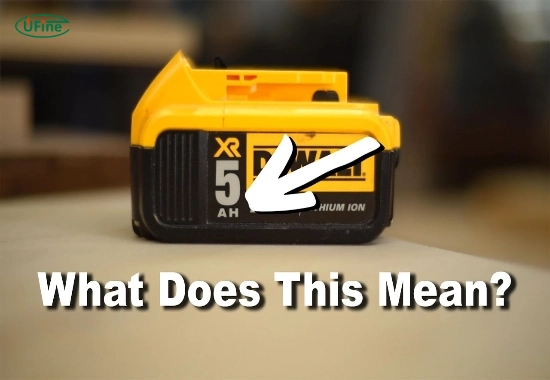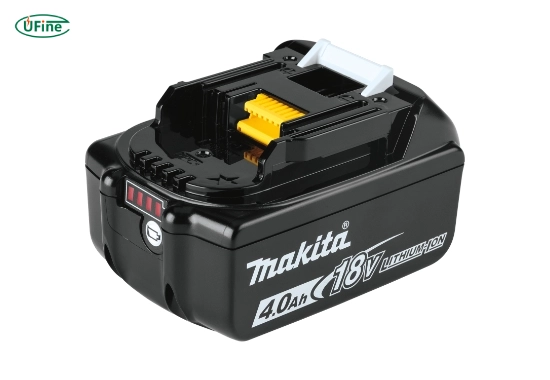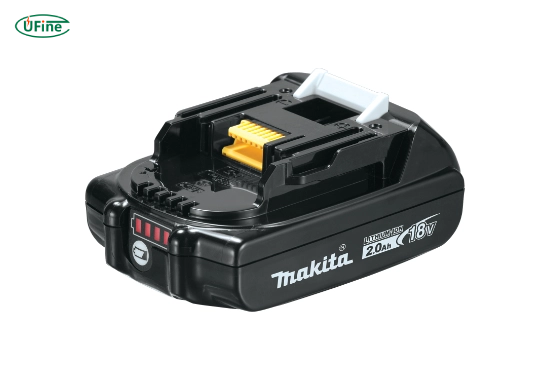One of the most common dilemmas when choosing the right battery for your cordless tools is: 4.0Ah vs. 2.0Ah battery—which one should you choose? You’re not alone if you’ve ever found yourself comparing these two options. The Ah rating is an essential factor that directly impacts your tools’ runtime, weight, and overall performance.
In this article, we’ll explain what makes a 4.0Ah battery different from a 2.0Ah battery, explore its advantages, and help you decide which one is better for your projects. We’ll also address some frequently asked questions to help you better understand how these batteries perform in real-world scenarios.
Part 1. What does Ah mean in a battery?
Ah (ampere-hour) is a measure of a battery’s capacity. It tells you how much charge a battery can hold, directly impacting how long it can power your device. For example, a 4.0Ah battery can deliver 4 amps of current for 1 hour, while a 2.0Ah battery delivers 2 amps of current for the same duration.
In simple terms: The higher the Ah rating, the longer the battery will last. However, this doesn’t necessarily mean that a higher Ah battery is always better—it depends on your usage and tool requirements, which we’ll explore in this article.
What Does Ah Mean on Lithium-ion Batteries?
Part 2. What is a 4.0Ah battery?
A 4.0Ah battery is a high-capacity battery designed to provide more energy storage, directly translating to longer runtime for your tools. The “4.0Ah” rating means the battery can deliver 4 amps of current for one hour before recharging.
Key features of a 4.0Ah battery:
- Longer runtime: Ideal for heavy-duty or extended projects.
- Larger size and weight: Typically bulkier than lower-capacity batteries.
- Longer charging time: It takes more time to recharge compared to smaller batteries.
- Higher cost: Generally more expensive due to its larger capacity.
A 4.0Ah battery is best for professionals or individuals who frequently work on demanding projects, such as construction, woodworking, or long outdoor tasks.
Part 3. What is a 2.0Ah battery?
A 2.0Ah battery is a lower-capacity battery better suited for lighter tasks or quick jobs. The “2.0Ah” rating means it can deliver 2 amps of current for one hour before requiring a recharge.
Key features of a 2.0Ah battery:
- Shorter runtime: Best for quick or light projects.
- Compact and lightweight: Easier to handle, making it ideal for handheld tools.
- Faster charging time: Recharges quicker than higher-capacity batteries.
- Lower cost: More affordable than higher Ah-rated batteries.
A 2.0Ah battery is perfect for DIY enthusiasts or those who use their tools occasionally and don’t require extended runtime.
Part 4. What are the key differences between 4.0Ah and 2.0Ah batteries?
To make the comparison more straightforward to understand, here’s a quick overview of the key differences between a 4.0Ah battery and a 2.0Ah battery:
- Capacity: A 4.0Ah battery has twice the energy storage capacity of a 2.0Ah battery.
- Runtime: The 4.0Ah battery provides significantly longer runtime, making it ideal for extended projects.
- Size and weight: A 4.0Ah battery is bulkier and heavier, while a 2.0Ah battery is compact and lightweight.
- Charging time: A 4.0Ah battery takes longer to recharge than a 2.0Ah battery.
- Cost: 4.0Ah batteries are more expensive due to their higher capacity.
Below is a table summarizing these differences:
| Feature | 4.0Ah Battery | 2.0Ah Battery |
|---|---|---|
| Capacity | High | Low |
| Runtime | Longer | Shorter |
| Size and Weight | Larger and heavier | Smaller and lighter |
| Charging Time | Longer | Shorter |
| Cost | More expensive | Less expensive |
Part 5. Which battery is better for heavy-duty projects?
If you’re working on large-scale or heavy-duty projects, such as construction or carpentry, a 4.0Ah battery is the better choice. Its higher capacity ensures that your tools will run longer without interruptions, which is crucial when you’re using power-hungry tools like:
- Circular saws
- Hammer drills
- Reciprocating saws
Although the 4.0Ah battery is heavier and takes longer to recharge, its extended runtime makes it worth the investment for professionals or users who rely on their tools for demanding work.
Part 6. Which battery is best for light or quick tasks?
A 2.0Ah battery is often better for smaller, less intensive projects. Its lightweight design and compact size make it easier to handle, especially for handheld tools like:
- Cordless drills
- Impact drivers
- Screwdrivers
Additionally, a 2.0Ah battery’s shorter charging time means you can quickly return to work if the battery runs out. This makes it ideal for DIY enthusiasts or anyone who doesn’t need extended runtime.
Part 7. How does battery weight affect usability?
Weight and ergonomics are key factors when choosing between a 4.0Ah and a 2.0Ah battery.
- 4.0Ah batteries are heavier, making tools harder to maneuver over long periods. This is especially noticeable in handheld tools.
- 2.0Ah batteries are lighter and more portable, making them easier for precision work or tight spaces.
If you prioritize comfort and ease of handling, the 2.0Ah battery might be the better choice. However, for stationary tools or tasks where weight isn’t a concern, the added capacity of a 4.0Ah battery is a clear advantage.
Part 8. Can you mix and match 4.0Ah and 2.0Ah batteries?
Yes, you can mix and match 4.0Ah and 2.0Ah batteries as long as they are compatible with your tool’s voltage requirements. Both batteries will provide the same power output, but keep the following in mind:
- A 4.0Ah battery will last longer but make the tool heavier.
- A 2.0Ah battery will make the tool lighter but require more frequent recharging.
This flexibility allows you to switch batteries depending on the task, maximizing both performance and convenience.
Part 9. Which battery is more cost-effective?
Regarding cost, 2.0Ah batteries are generally more affordable than 4.0Ah batteries. If you’re on a budget or don’t need extended runtime, the 2.0Ah battery is the most economical.
However, frequent users may find that the higher upfront cost of a 4.0Ah battery pays off in the long run due to fewer interruptions and less time spent charging.
Part 10. How do 4.0Ah and 2.0Ah batteries perform in real-world scenarios?
The performance of these batteries largely depends on the tool and task:
- 4.0Ah batteries excel in high-demand scenarios, such as cutting, drilling, or grinding for extended periods.
- 2.0Ah batteries are better suited for light-duty tasks or projects where portability and weight are more important than runtime.
Understanding how these batteries perform in different situations can help you choose the one that best suits your needs.
Part 11. FAQs
-
What does Ah mean in batteries?
Ah (ampere-hour) measures a battery’s capacity or how much energy it can store. A higher Ah rating means a longer runtime. -
Can I use a 4.0Ah battery in place of a 2.0Ah battery?
Yes, as long as the voltage is compatible with your tool. The main differences will be runtime and weight. -
Does a 4.0Ah battery last twice as long as a 2.0Ah battery?
In most cases, yes. A 4.0Ah battery generally has twice the capacity of a 2.0Ah battery, resulting in a longer runtime. -
Are 4.0Ah batteries heavier than 2.0Ah batteries?
Yes, 4.0Ah batteries are bulkier and heavier due to their larger capacity. -
Which battery is better for precision work?
A 2.0Ah battery is better for precision tasks because it is lighter and easier to handle.
Related Tags:
More Articles

How to Choose the Best Floor Scrubber Battery for Commercial Cleaning?
Selecting the ideal floor scrubber battery ensures a long runtime, rapid charging, and minimal maintenance for efficient commercial cleaning operations.
Battery for Blower vs Battery for Leaf Vacuum: Which One Should You Choose?
Battery for blower vs leaf vacuum—learn the key differences in power, fit, and runtime to choose the right battery for your outdoor tool needs.
How to Choose the Right Battery for Blower?
Choosing the right blower battery? Consider voltage, capacity, chemistry & usage. This guide helps match the best battery for peak performance.
How to Choose the Best Insulated Battery Box for Lithium Batteries?
Choosing the Best Insulated Battery Box for Lithium Batteries? Discover key factors such as size, material, and safety for optimal protection and performance.
7 Critical Elements on a Lithium Battery Shipping Label
What must be on a lithium battery shipping label? Learn 7 key elements to ensure safety, legal compliance, and correct handling across all transport modes.






